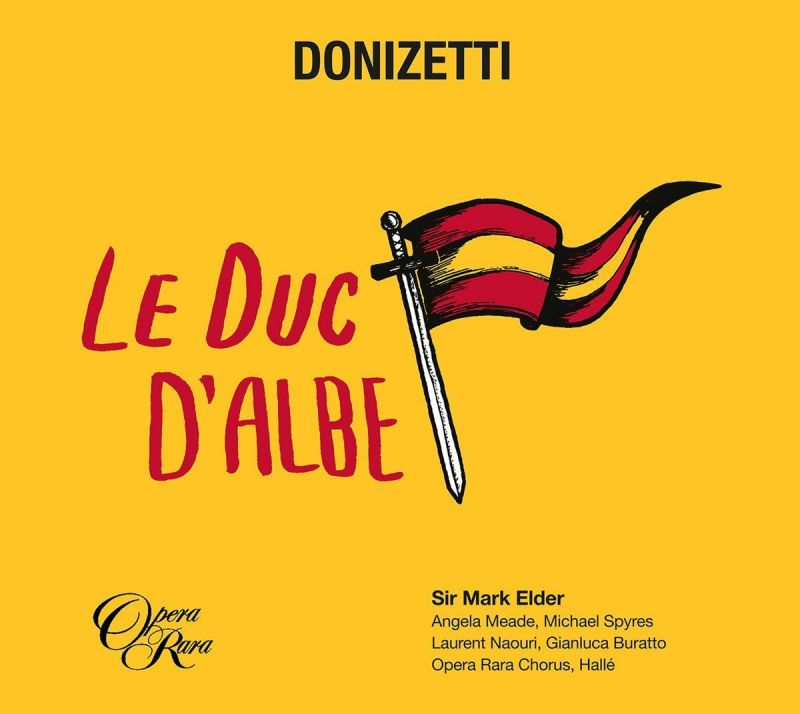DONIZETTI Le Duc d’Albe
View record and artist detailsRecord and Artist Details
Composer or Director: Gaetano Donizetti
Genre:
Opera
Label: Opera Rara
Magazine Review Date: 04/2016
Media Format: CD or Download
Media Runtime: 93
Mastering:
DDD
Catalogue Number: ORC54

Tracks:
| Composition | Artist Credit |
|---|---|
| (Il) Duca d'Alba |
Gaetano Donizetti, Composer
Angela Meade, Hélène d’Egmont, Soprano David Stout, Sandoval, Baritone Dawid Kimberg, Innkeeper, Baritone Gaetano Donizetti, Composer Gianluca Buratto, Daniel Brauer, Bass Hallé Orchestra Laurent Naouri, Duc d'Albe, Bass Mark Elder, Conductor Michael Spyres, Henri de Bruges, Tenor Opera Rara Chorus Robin Tritschler, Balbuena, Tenor Trystan Llyr Griffiths, Carlos, Tenor |
Author: Hugo Shirley
Opera Rara has decided here only to record what is largely Donizetti’s own music, which means just the first two acts – but you’ll have to go as far as the third page of the booklet to find this significant piece of information. The final two acts were too fragmentary, Parker explains, to have been presented without major filling-in work from elsewhere; the first two acts are 95 per cent complete. Martin Fitzpatrick, a member of English National Opera’s music staff, has joined the dots to present a performable version of them, a brief but very convincing prelude at the start being the most substantial contribution.
So what we have is but a torso, tantalising and inevitably positing several major what-ifs. And it’s all the more tantalising since the first two acts are dispatched with all the style and élan we’ve come to expect from Mark Elder in this music, here with the Hallé. He brings conviction, stylistic nous and a wonderful airy clarity to the score, and his Manchester orchestra play very well, though without being quite so revelatory, for me, as the Orchestra of the Age of Englightenment were in the admittedly more rewarding task of Les martyrs (6/15).
Michael Spyres returns as the hero, in this case Henri, the Flemish rabble-rouser who is treated with suspicious magnanimity by the Duke himself: in the fourth act he was to have found out, Luke Skywalker-like, that his nemesis was in fact his father. Angela Meade is impressive as his beloved Hélène, the defiant daughter of the same count Egmont immortalised in Goethe’s play (and Beethoven’s overture), who gets a thrilling aria in Act 1. Both these singers turn in persuasive, tirelessly sung performances, even if neither has a voice to convey the sort of dramatic intensity and individuality that would be able to give this music an extra boost. The only francophone in the cast, Laurent Naouri is imposing, but also lacks vocal focus as the Duke, while Gianluca Buratto is a touch woolly as the brewer Daniel – we’re in Brussels, so beer plays an unusually prominent part. There are fine contributions from the rest of the cast.
The score is of course of great interest, with many fine moments: that big aria for Hélène and the duet between the Duke and his son in Act 1; the furtive conspirators’ ensemble starting at Daniel’s ‘Plus bas…Plus bas’ (disc 2, tr 8); a lovely extended duet between Henri and Hélène (crowned with an exciting if slightly pressed top E flat from both singers); and a rousing final hymn to freedom in Act 2. But with just these two acts we have little chance to develop any sympathy for the characters, not least regarding the dilemma facing the Duke himself; or, of course, to hear how Donizetti, with the necessary exposition behind him, would have risen to the challenges posed by the rest of the libretto.
Opera Rara certainly can’t be blamed for all that, though; instead the label should be thanked for yet another fascinating and important release, presented with all its usual care, seriousness and lavish attention to detail – even if the appeal of the set might be a little more specialist than some.
Discover the world's largest classical music catalogue with Presto Music.

Gramophone Digital Club
- Digital Edition
- Digital Archive
- Reviews Database
- Full website access
From £8.75 / month
Subscribe
Gramophone Full Club
- Print Edition
- Digital Edition
- Digital Archive
- Reviews Database
- Full website access
From £11.00 / month
Subscribe
If you are a library, university or other organisation that would be interested in an institutional subscription to Gramophone please click here for further information.




